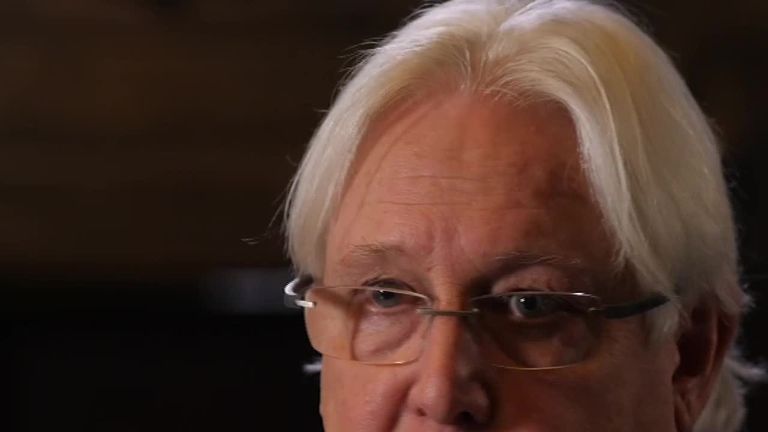UK sold 拢5.7bn of arms to Saudi-led coalition fighting in Yemen
The war in Yemen has seen thousands die and 20 million more live on the brink of famine since it formally began four years ago.
Friday 29 March 2019 12:54, UK
The UK sold at least 拢5.7bn worth of arms to the Saudi-led coalition fighting in Yemen since the start of the war in 2015, figures show.
Sky News analysis shows more than 80% of those sales have been received by Saudi Arabia.
The total figure could be much higher because of the use of a type of licence which allows the agreement to be extended over time. The government is not obliged to clarify the final figure.
Figures from the Department of International Trade, compiled by the Campaign Against Arms Trade, and verified and analysed by Sky News, show the UK government licensed £5.7bn worth of arms to the coalition.
The war in Yemen, which is widely accepted as having begun formally in March 2015, has seen thousands die and 20 million more live on the brink of famine.
The coalition is fighting against Yemeni rebels and their allies, who drove a Saudi-backed and internationally recognised government into exile.
Led by , the coalition is made up of the UAE, Egypt, Bahrain, Jordan, Kuwait, Senegal and Sudan - and it is backed by the US, UK and France.
Qatar was also a member of the coalition until it left in June 2017, while Morocco suspended its participation in February this year.
The UK has sold arms to all countries who are or were part of this coalition, with the exception of Sudan.
The value of the licences provided from the start of the war up to the latest available data, or until the country no longer was part of the coalition, are:
- Saudi Arabia: £4.7bn
- United Arab Emirates: £600m
- Qatar: £143m
- Egypt: £120m
- Bahrain: £70m
- Jordan: £43m
- Kuwait: £36m
- Morocco: £6m
- Senegal: £300,000
The total amount of British arms sold to the coalition being used in the Yemen war, rather than for other purposes, is unknown.
A report published in February stated that British and American bombs have killed and maimed nearly 1,000 civilians - including more than 120 children in Yemen - since the beginning of the war.
The report was carried out by the US-based University Network for Human Rights (UNHR) and Yemeni monitoring group Mwatana.
The number of weapons and the amount of money the UK has accrued from military sales to the counties will be higher than currently reported.
Open licences, known as OIELs, have been described as "secretive" by campaign groups because they allow an uncapped number of items to be sent to another country for five years.
There is currently no obligation on the government to publish the total value of the licence when it ends.
All of the countries in the coalition have had weapons licensed to them under these OIELS.
A spokesperson for the Department for International Trade said: "The government takes its export responsibilities very seriously. We operate one of the most robust export control regimes in the world and keep our defence exports to Saudi Arabia under careful and continual review.
"All export licence applications are assessed on a case-by-case basis against the Consolidated EU and National Arms Export Licensing Criteria, taking account of all relevant factors at the time of the application.
"We will not a grant a licence if to do so would be inconsistent with these criteria."
Jeremy Hunt became the first British foreign secretary to visit the country in more than 20 years this year. He .
Meanwhile, US support for the war is waning. Earlier this month, the US Senate approved a bill to end support for the Saudi-led coalition war within 30 days.
President Donald Trump, who has sought close relations with the Saudis, had vowed to veto it.
Andrew Smith of Campaign Against Arms Trade, which is legally challenging the UK government's decision to continue to license the export of military goods to Saudi Arabia, said: "No matter how bad the crisis in Yemen has become, the Saudi-led coalition has been able to depend on the continued political and military support of the UK government.
"Jeremy Hunt has talked about the need for peace, but this war would not be possible without the fighter jets and bombs that are being sold by arms dealing government like the UK."






